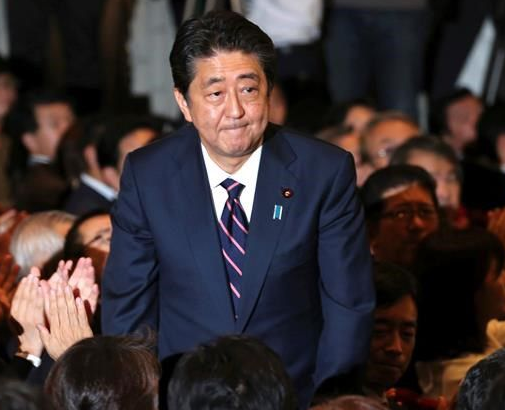Tokyo (Agencies): Prime Minister Shinzo Abe was re-elected to another three-year term as leader of Japan's ruling party on Thursday, as he aims to become the country's longest-serving leader in modern times.
Abe, who turns 64 on Friday, won 553 of the 807 votes cast. His challenger, 61-year-old former Defense Minister Shigeru Ishiba, managed just 254. The election was decided by parliamentary members and rank-and-file party members, with each controlling half of the total votes.
The prime minister garnered 82% of the parliamentary vote, but among rank-and-file members support was a more modest 55%. "Abe has achieved the basic goal [of scoring a solid win], but the results also showed that there is some discontent," said Naoto Nonaka, professor of political science at Tokyo's Gakushuin University.
Nonaka said that Abe's push for revising the nation's pacifist constitution may have cost him some support, even as most party members support his economic policies.
Abe underlined the fact that he won 69% of the total vote, saying this margin is more than Liberal Democratic Party prime ministers of previous decades had gained and that he takes the outcome as a "strong mandate for his leadership."
Abe's victory comes as a relief to Japan's business community. "The re-election of Shinzo Abe as LDP president -- and, consequently, retaining the premiership -- implies overall policy continuity and provides stability in the context of prevailing risks to the Japanese economy," said Christian de Guzman, vice president and senior credit officer at Moody's Investors Service. "It also alleviates some uncertainty with regards to the proposed consumption tax hike scheduled for October 2019, while offering greater scope for labor and social security reform to mitigate Japan's demographic decline."
The contest was a rerun of the leadership race in September 2012, during which Ishiba led Abe in the first round, but ultimately lost in the runoff vote. Abe ran uncontested in a September 2015 election for a second term.
Ishiba indicated his willingness to run for the top spot again. "The results show that there is a lot of support for my policy platform," he said. "It's my responsibility to have it reflected in the policies of the party and of the government going forward."
The election was held following a rule change that now allows prime ministers to serve for three consecutive terms instead of two, granting Abe his wish to preside over the 2020 Summer Olympics, which he played a large part in bringing to Tokyo.
Because the LDP owns a majority in both houses of parliament, the head of the party is the leader of the country.
Abe previously served as prime minister for one year between 2006 and 2007, but was forced to step down due to low popularity ratings and personal illness, contributing to the party being ousted from power in 2009.
The LDP returned to power in the December 2012 electoral landslide, and since then has won four subsequent national elections. Abe now has a shot at becoming Japan's longest-serving prime minister.
He and his cabinet have received solid public support over the past six years. In an August Nikkei opinion poll, his cabinet had a 48% approval rating against 42% who disapproved.
In recent years, Abe's administration has been marred by political scandals, including allegations that he and his aides have given favors to close supporters, including granting a college license application and approving purchase of government property. The allegations sent approval ratings briefly plummeting below 40% last year, with those disapproving above 50%.
Attention is already shifting to what Abe hopes to accomplish during his last term. Revising the U.S.-drafted constitution to give the Self-Defense Forces -- the nation's de facto military -- clear statutory recognition is his and the party's long-held goal. The change is widely seen as a long shot, but Abe is still expected to try and push it through.
"I will settle the accounts of our postwar foreign policy to make peace and stability more secure for the country," Abe said after the election, clearly referring to his efforts to normalize diplomatic relations with North Korea and sign a peace treaty with Russia.
"Together with you, I will embark on the task of revising the constitution," he added.
During a news conference held later in the day, Abe said he expects an amendment bill will be tabled to the next parliamentary session, presumably later this autumn.
He also reiterated his commitment to lift the nation out of deflation in the next three years, even as the 2% inflation target appears out of reach in the near term. Abe said that deflation can only be defeated by sticking to the target, not by scrapping it.


